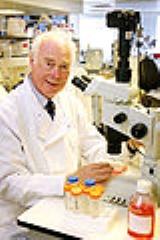
Martin Evans
Overview
Sir Martin John Evans FRS
(b. 1 January 1941, Stroud
, Gloucestershire
) is a British
scientist who, with Matthew Kaufman
, was the first to culture
mice embryonic stem cell
s and cultivate them in a laboratory in 1981. He is also known, along with Mario Capecchi
and Oliver Smithies
, for his work in the development of the knockout mouse
and the related technology of gene targeting
, a method of using embryonic stem cells to create specific gene modifications in mice. In 2007, the three shared the Nobel Prize in Physiology or Medicine
in recognition of their discovery and contribution to the efforts to develop new treatments for illnesses in humans.
He won a major scholarship to Christ's College
, University of Cambridge at a time when advances in genetics
were occurring there and became interested in biology
and biochemistry
.
Royal Society
The Royal Society of London for Improving Natural Knowledge, known simply as the Royal Society, is a learned society for science, and is possibly the oldest such society in existence. Founded in November 1660, it was granted a Royal Charter by King Charles II as the "Royal Society of London"...
(b. 1 January 1941, Stroud
Stroud
Stroud a town and civil parish in the county of Gloucestershire, England.Stroud may also refer to:*Stroud, New South Wales, Australia*Stroud, Ontario, Canada*Stroud , Gloucestershire, UK*Stroud...
, Gloucestershire
Gloucestershire
Gloucestershire is a county in South West England. The county comprises part of the Cotswold Hills, part of the flat fertile valley of the River Severn, and the entire Forest of Dean....
) is a British
United Kingdom
The United Kingdom of Great Britain and Northern IrelandIn the United Kingdom and Dependencies, other languages have been officially recognised as legitimate autochthonous languages under the European Charter for Regional or Minority Languages...
scientist who, with Matthew Kaufman
Matthew Kaufman
Matthew H. Kaufman is Professor Emeritus at University of Edinburgh having been Professor of Anatomy there from 1985–2007. He has taught anatomy and embryology for more than 30 years, initially at the University of Cambridge, when he was a Fellow of King’s College, and more recently in...
, was the first to culture
Cell culture
Cell culture is the complex process by which cells are grown under controlled conditions. In practice, the term "cell culture" has come to refer to the culturing of cells derived from singlecellular eukaryotes, especially animal cells. However, there are also cultures of plants, fungi and microbes,...
mice embryonic stem cell
Embryonic stem cell
Embryonic stem cells are pluripotent stem cells derived from the inner cell mass of the blastocyst, an early-stage embryo. Human embryos reach the blastocyst stage 4–5 days post fertilization, at which time they consist of 50–150 cells...
s and cultivate them in a laboratory in 1981. He is also known, along with Mario Capecchi
Mario Capecchi
Mario Renato Capecchi is an Italian-born American molecular geneticist and a co-winner of the 2007 Nobel Prize in Physiology or Medicine for discovering a method for introducing homologous recombination in mice employing embryonic stem cells, with Martin Evans and Oliver Smithies...
and Oliver Smithies
Oliver Smithies
Oliver Smithies is a British-born American geneticist and Nobel laureate, credited with the invention of gel electrophoresis in 1955, and the simultaneous discovery, with Mario Capecchi and Martin Evans, of the technique of homologous recombination of transgenic DNA with genomic DNA, a much more...
, for his work in the development of the knockout mouse
Knockout mouse
A knockout mouse is a genetically engineered mouse in which researchers have inactivated, or "knocked out," an existing gene by replacing it or disrupting it with an artificial piece of DNA...
and the related technology of gene targeting
Gene targeting
Gene targeting is a genetic technique that uses homologous recombination to change an endogenous gene. The method can be used to delete a gene, remove exons, add a gene, and introduce point mutations. Gene targeting can be permanent or conditional...
, a method of using embryonic stem cells to create specific gene modifications in mice. In 2007, the three shared the Nobel Prize in Physiology or Medicine
Nobel Prize in Physiology or Medicine
The Nobel Prize in Physiology or Medicine administered by the Nobel Foundation, is awarded once a year for outstanding discoveries in the field of life science and medicine. It is one of five Nobel Prizes established in 1895 by Swedish chemist Alfred Nobel, the inventor of dynamite, in his will...
in recognition of their discovery and contribution to the efforts to develop new treatments for illnesses in humans.
He won a major scholarship to Christ's College
Christ's College, Cambridge
Christ's College is a constituent college of the University of Cambridge.With a reputation for high academic standards, Christ's College averaged top place in the Tompkins Table from 1980-2000 . In 2011, Christ's was placed sixth.-College history:...
, University of Cambridge at a time when advances in genetics
Genetics
Genetics , a discipline of biology, is the science of genes, heredity, and variation in living organisms....
were occurring there and became interested in biology
Biology
Biology is a natural science concerned with the study of life and living organisms, including their structure, function, growth, origin, evolution, distribution, and taxonomy. Biology is a vast subject containing many subdivisions, topics, and disciplines...
and biochemistry
Biochemistry
Biochemistry, sometimes called biological chemistry, is the study of chemical processes in living organisms, including, but not limited to, living matter. Biochemistry governs all living organisms and living processes...
.
Discussions

